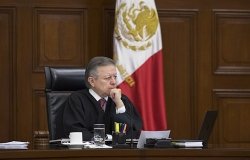Report: Can Turkey’s AKP Be a Model for Arab Islamists?
Turkey’s ruling Justice and Development Party (AKP) offers a moderate political model that may be attractive to Arab Islamists, according to a new report by The Brookings Institution. The AKP promotes Islamic values without seeking to establish an Islamic state by embracing “passive secularism.” Islamist parties in Tunisia and Morocco are already close to the AKP model, since neither party calls for a constitutional reference to Sharia, or Islamic law.
Turkey’s ruling Justice and Development Party (AKP) offers a moderate political model that may be attractive to Arab Islamists, according to a new report by The Brookings Institution. The AKP promotes Islamic values without seeking to establish an Islamic state by embracing “passive secularism.” Islamist parties in Tunisia and Morocco are already close to the AKP model, since neither party calls for a constitutional reference to Sharia, or Islamic law. But Egypt’s Freedom and Justice Party (FJP)—which considers Sharia a primary source of law—is less likely to adopt the AKP model, according to the report. The FJP played an instrumental role in passing Egypt’s new constitution, which grants religious scholars a role in interpreting Sharia. The following are excerpts from the report, followed by a link to the full text.
THE AKP MODEL: MUSLIM, BUT NOT ISLAMIST
Another key characteristic of the AKP is its pragmatic understanding of Muslim politics. It is this understanding which allows the party to comfortably occupy a position somewhere between assertive secularism on the one hand and Islamism on the other. According to this perspective, Muslim individuals and groups can promote their Islamic views in a democratic system through legislative processes, participation in political or judicial institutions, and engagement with civil society and the media. They can reflect Islamic ethics by, for instance, fighting corruption and nepotism, or promoting justice. Islamic parties can also promote their diverse understandings of sharia through free and democratic processes. In this way, there is no need to formally name the state “Islamic” in order to promote Islamic principles in politics. After all, there are many outwardly “Islamic states” that in reality fail to uphold what many would perceive to be Islamic principles in their everyday politics.
On its critical stance toward Islamism and the need for an “Islamic state,” the AKP is in agreement with other major religious actors in Turkey, including the influential Gülen movement. According to public surveys, although seventy percent of Turks are practicing Muslims, only nine percent of them support a sharia-based state. Polls reflect much higher levels of support for sharia law in Arab countries. The same Arab world surveys, however, also indicate overwhelming support of democracy, pointing to a belief in – or at least a desire for compatibility between democracy and their religious sensitivities…
THE AKP MODEL: PRAGMATIC, NOT RADICAL
The AKP has acted pragmatically on various policy issues, including the relationship between Islam and secularism. It regularly considers the balance of power in Turkey, as well as in world politics, prior to taking a stance on any given issue. The official party document elaborating its “conservative democratic” ideology provides further insight into this pragmatism. With the term “conservative,” the party seeks to highlight its prudence and emphasis on gradual change while rejecting any type of radicalism (be it assertive secularist, Islamist, socialist, or liberal). In its criticisms of French Jacobinism and rationalist radicalism, the party’s conservatism refers to thinkers such as Michael Oakeshott and Edmund Burke.
Arab Islamist parties are likely to take the AKP’s pragmatism seriously given its success on several fronts. Domestically, the party’s policies on economic development, universal health coverage, and housing projects have played a big part in ensuring its victories in five national elections (three parliamentary and two municipal).
Internationally, the AKP has succeeded in convincing the United States and European countries that a party with roots in Islamism can be a reliable ally. One could argue that the AKP experience in the 2000s is one of the reasons why Western countries are today more tolerant toward Islamists in states affected by the Arab Spring. Western governments’ relatively warm reception of democratically elected Islamists after 2011 contrasts strongly with their hostility toward Islamist groups in the 1990s.
Erdoğan has shown unprecedented flexibility in his foreign policy, pursuing often paradoxical and risky policies. For example, he has strongly criticized Israel while maintaining good relations with the United States, and he rejected new sanctions on Iran in the United Nations Security Council while accepting the deployment of NATO’s anti-Iran radar system in Eastern Turkey.
Among other things, then, the AKP presents a model of how a Muslim-majority country can engage with the West in a friendly but critical way. Reacting to German and French opposition to Turkey’s membership to the European Union, as well as to rising Islamophobia, Erdoğan has never shied away from criticizing European countries; yet he has also been committed to Turkey’s membership in NATO and other Western institutions. Maintaining warm relations with Western countries has been central to the AKP’s successes in promoting economic growth and development.
In addition to providing a formula for addressing the relationship between Islam and politics, the AKP model can show Arab Islamists that a similarly pragmatic approach to domestic and international politics (rather than insisting on uncompromising or inflexible policies) can bring important dividends.
Click here for the full report.
Related Program

The Islamists
Learn more about Hamas and how it relates to similarly aligned organizations throughout the region. Read more









